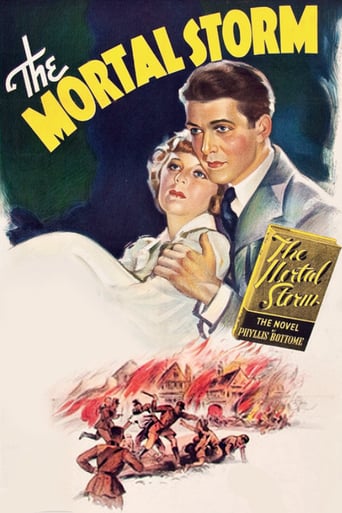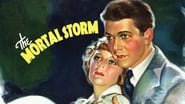antoniocasaca123
A good film by Frank Borzage, curiously a director who has won 2 Oscars and is practically a stranger. We have seen many films in the second war but few on the awakening of Nazism, when Hitler comes to power in 1933, and the consequences of this in Germany itself, particularly in the families and relations between people, depending on the position of each on ideology of Hitler and Nazism. The first half of the film is extremely well made and credible, with Hitler's supporters wanting to impose the new ideology by force on those who do not refer to that ideology. We see that, very quickly, non-supporters of the regime were persecuted, arrested and even murdered. Hitler's doctrine was quickly assimilated by much of the German youth of the time. Thankfully there were exceptions such as the cases of the characters played by James Stewart and Margaret Sullavan, in the figure of two in love that Nazism in Germany threatens to separate. All these aspects are shown very convincingly in the first half of the film. The second half of the movie does not have the same level as the first, being a bit melodramatic and dragged. The film culminates in a beautiful scene filmed by Borzage, with the leading pair, on the run, "getting lost" in the snow...
richard-1787
During World War II, the U. S. government made a series of propaganda movies entitled *Why We Fight* that were first shown to American troops before being released in American movie theaters.This movie, which dates from 1940, over a year before we entered World War II, might have been subtitled *Why We Will Have to Fight*. It is not subtle, and it is often difficult to watch because it gives you a terrible sense of what it must have been like to live in Germany after Hitler came to power. When we see first Frank Morgan, who the year before had been the lovable Wizard of Oz, and then Margaret Sullavan killed by Nazis, and James Stewart hounded out of his homeland, we see that Germany must be a terrible place, a threat to the American way of life.We see that, if they attack us, we will have to stop this way of life.The acting here is all fine. The script is nothing great, because it never lets us understand how so many people could have been won over to Hitler's propaganda. Movie-goers in 1940 were probably surprised to see the female lead killed rather than escaping with Stewart to live happily in Austria - at least until Hitler annexed that. This is propaganda, but for a good cause. It's not a great movie, but there's nothing wrong with it. It's no *Casablanca*, surely, but then what other movie is?
mmallon4
I try to avoid calling movies underrated or saying "Why is this not more well known?!", otherwise I would sound like the most malfunctioning record but as to why The Mortal Storm is not more famous goes beyond just my own personal preferences. The fact that Hollywood's then biggest studio Metro Goldwyn Mayer would release an anti-Nazi film at a time when the US and Germany where not involved in conflict; a movie which would then entice a country who were involved in a conflict of which the US had a neutral stance towards. To give some historical context, although it seems hard to believe nowadays, fascist and other Nazi like ideas where widespread throughout the United States during the 20's and 30's (heck, just look at the film Gabriel Over the White House from 1933, also released by MGM, or the public initial backlash against films with anti-fascist sentiments such as Sergeant York or To Be Or Nor To Be). Prior to the US involvement in the war, there was even uncertainty as to whether or not the US should take part in the conflict in Europe. This movie being overlooked is criminal. It deserves the special edition DVD treatment with documentaries behind its production. I'm sure there must be an interesting story behind the making of this film. MGM have generally been seen as a studio who played it safe, thanks in part to its conservative studio head Louis B. Mayer. So it comes as a surprise The Mortal Storm would come from this studio and they paid the price. The Mortal Storm lead to MGM films being banned in Germany. The word Nazi is never used once throughout the film, while the characters I can only assume are Jews are referred to as Non- Aryan. I wonder if this was done to prevent further controversy surrounding the film but it's still an incredibly brave picture.The core story is about of Nazism affected common families and their friends. The Roths (Jewish I assume) are a happy picture postcard family one day, the next there are completely torn apart. The professor of the town's local university is treated with the highest of respect one day, the next his students are boycotting his class after he states that science has shown there is no difference between the blood of various races. The Mortal Storm is a work of propaganda, not that there's anything wrong with that. Propaganda is an art form in itself, one which tries to get an emotional reaction out of the viewer in order to convert them to one side. The Mortal Storm achieves just that. The tension during the film just builds and builds, ending in an ending which is one huge punch to the gut. Watching the film again in order to write this review I surprised just how engaging it was on a further viewing. There are many little touches I never noticed previously, such as when Robert Young's character announces his engagement to Margaret Sullavan, James Stewart is the only character the room who does react with joy. Majority of the film is shot on sets with the use of painted backgrounds and miniatures, yet the whole thing still looks fantastic, and looks more idyllic than real world locations could.You really get a sense for this small town in the alps. The only complaint if any I can find with the film is the opening narration at the beginning which is overly bombastic.The casting of the previously paired Shop Around the Corner stars couldn't be more perfect. James Stewart and Margaret Sullavan play two friends who are forced to become lovers due to the impending circumstances. I can't recall any other movies which portray a love story like this. Sullavan often portrayed characters who represented bravery; her voice is so fragile yet powerful at the same time. The cast isn't the only tie the film shares with The Shop Around the Corner; both films represent a European society which was on the brink of destruction.
DKosty123
This very political look at Pre-World War 2 Europe is a solid multi-faceted drama about a family being torn apart by the Nazis. While the film does not mention Germany by name, it has plenty of swastika's and does feature a ski escape sequence to Austria. Jimmy Stewart leads a fine cast with a great role by Frank Morgan as the ailing father of the family and Margaret O'Brien. Robert Young plays a Nazi officer who is a big departure from Father Knows Best which came much later. Young is convincing in his role.The most powerful and disturbing line to me is when the son quotes what he is being taught in school. The line goes like "We must all sacrifice our personal lives and beliefs in order to further the cause of our government." While I might not have the quote exactly right, the idea behind it is that we are supposed to follow our government like some bunch of blind and mindless robots. This idea reminds me very much of some issues in our government and society today.The reason this is not the perfect movie is it does suffer from the time the movie was made. The ski escape sequence particularly suffers from the crude technology of the times. It is hard to imagine all those actors out in the cold mountains skiing without being dressed warmly. This stuff is very obviously staged in a studio and crudely done.That does not take away from a well written script, a terrific cast and a timeless drama.





